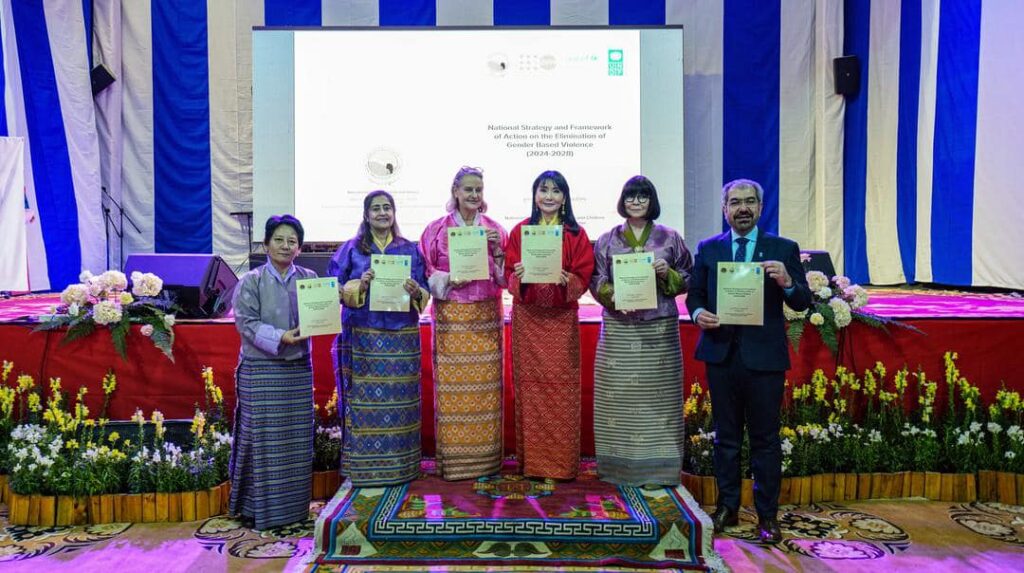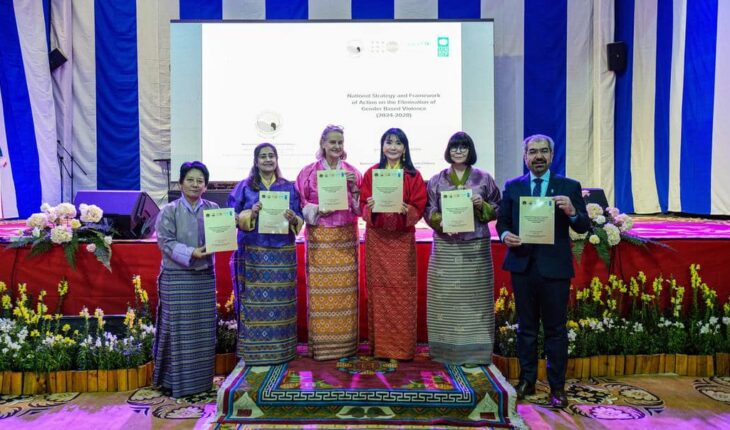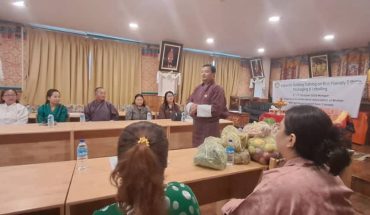
NGAWANG JAMPHEL
Thimphu
In a historic move towards gender equality, Her Majesty Gyalyum Sangay Choden Wangchuck launched Bhutan’s National Strategy and Framework of Action on the Elimination of Gender-Based Violence (GBV). This comprehensive strategy, developed by the National Commission for Women and Children (NCWC) in collaboration with UNFPA, UNDP, and UNICEF, outlines a roadmap to combat GBV and create a safer, more equitable society.
The strategy is a crucial step in Bhutan’s commitment to achieving Sustainable Development Goal (SDG) 5 on Gender Equality and over 80 related SDG indicators. According to a 2019 study on violence against women and girls, two in five Bhutanese women experience at least one form of partner violence, with over half believing it is sometimes justified. Childhood exposure to violence further increases the likelihood of experiencing or perpetrating partner violence in adulthood. The strategy seeks to address these alarming trends through a holistic approach built on four key pillars: Response, Prevention, Enabling Environment, and Data and Evidence.
The launch of this strategy coincides with the 30th anniversary of the Beijing Declaration and Platform for Action, a landmark global blueprint for gender equality. Bhutan’s GBV strategy aligns with the Beijing+30 review, which reflects on progress made and remaining challenges.
The Response pillar prioritizes establishing accessible, high-quality, and comprehensive services for all GBV survivors by 2028. The Prevention pillar focuses on shifting societal attitudes towards zero tolerance for GBV through education and awareness. Strengthening legal frameworks and institutional mechanisms falls under the Enabling Environment pillar, while the Data and Evidence pillar aims to build a robust system for data collection and analysis to guide future policies.
Emphasizing the importance of the initiative, Kesang Deki, Chairperson of NCWC, stated, “Today marks a hopeful and transformative step towards a safer, more equal Bhutan. The launch of the National Strategy and Framework of Action on Elimination of Gender-Based Violence demonstrates our collective determination to protect the rights and dignity of all women and girls. While the prevalence of violence remains a challenge, we are confident that we can shift societal attitudes, strengthen legal frameworks, and ensure that every Bhutanese citizen lives free from violence. This strategy is not just a plan—it’s a promise to future generations that we will create a society where gender equality and safety are the foundation of our shared values.”
Karla Robin Hershey, UN Resident Coordinator for Bhutan, highlighted the need for collective action. “Ending gender-based violence requires more than policies and frameworks—it demands collective action, continuous advocacy, and a shift in mindsets to create a culture of equality, respect, and non-violence.”
UNFPA Country Director Andrea M. Wojnar reaffirmed the strategy’s significance, stating, “The launch of the GBV Prevention and Response Strategy marks a critical step toward ensuring that all women and girls can live free from violence and exercise their rights and choices. This strategy strengthens collective efforts to prevent and respond to gender-based violence by fostering collaboration between government, civil society organizations, and front-line service providers, with survivors at the center of these efforts.”
UNDP Resident Representative Mohammad Younus stressed the importance of a coordinated approach. “The National Strategy and Framework for Action to Combat GBV, which builds on our longstanding partnership with NCWC, is a blueprint to bring all stakeholders together for a more coordinated and holistic approach to tackling violence against women and girls. UNDP remains committed to supporting efforts to translate the strategy into tangible actions for a lasting impact.”
UNICEF also highlighted the connection between violence against women and children, calling for integrated efforts. “Evidence shows that Violence Against Women and Violence Against Children often coexist within households, share common risk factors, and can be addressed by preventing the root causes. This strategy will integrate our efforts to create a safer environment for both women and children. UNICEF is committed towards scaling up evidence-based prevention interventions for girls, boys, and women at greatest risk of violence, and strengthening access to response and support services to prevent recurrence and break the intergenerational cycle of violence.”
Bhutan has extensively studied gender-based violence to inform its policies. In 2017, a nationally representative household survey on violence against women (VAW) was conducted using the WHO methodology. Led by NCWC with financial support from the Austrian Development Agency (ADA) and UNDP, the study remains the most comprehensive data source on GBV in Bhutan.
The survey, which interviewed 2,184 women and girls aged 15 to 64, revealed that more than two in five women about 44.6 per cent have experienced intimate partner violence in their lifetime. One in three of about 30 percent reported experiencing such violence in the past year. Physical violence affected 13.9 per cent of ever-partnered women and girls, while 5.1per cent faced it in the past year. Sexual partner violence was reported by 4.5 per cent over a lifetime and 2.3 per cent in the past year.
The study also found that controlling behaviors by partners were the most common form of violence, affecting 35.3 per cent of women over their lifetime and 24.3 per cent in the past year. Economic violence, such as preventing women from earning an income, impacted 10.9 per cent of women in their lifetime, with a higher prevalence among those without income.
Non-partner violence was also significant, with 12.5 per cent of women reporting physical violence and 5.8 per cent experiencing sexual violence from non-partners. Perpetrators of non-partner violence included family members, teachers, acquaintances, and strangers. Childhood sexual abuse affected 6.9 per cent of women and girls, with most cases occurring between ages 10 and 14.
Bhutan’s National Strategy and Framework of Action on the Elimination of GBV represents a collective commitment to tackling gender-based violence through a multi-sectoral approach. By focusing on response services, prevention efforts, legal reforms, and data-driven strategies, Bhutan is paving the way for a future where all individuals—especially women and girls—can live without fear of violence.
With strong backing from national and international stakeholders, the strategy aims to bring about lasting societal change, ensuring that gender equality and safety become foundational principles of Bhutanese society.





